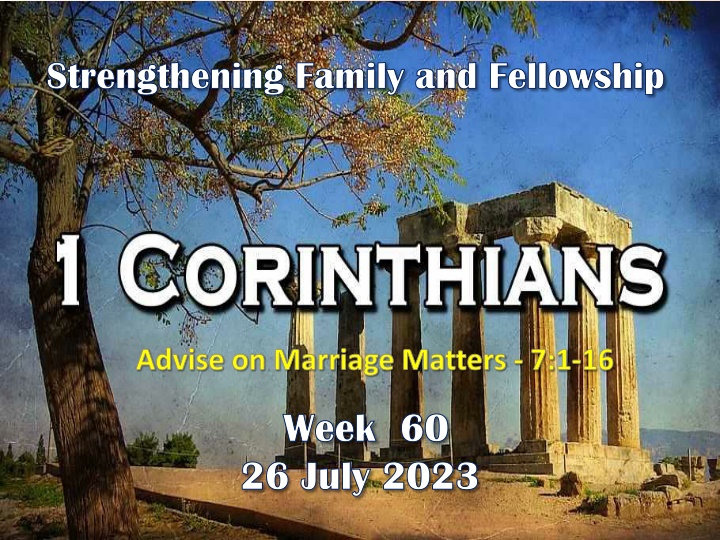Strengthening Family and Fellowship: Advising on Marriage Matters
Paul's letter to the Corinthians addresses controversial topics related to marriage, divorce, cultural taboos, and gender roles in worship, aiming to strengthen family bonds and promote unity in the church.
Uploaded on Mar 04, 2025 | 0 Views
Download Presentation

Please find below an Image/Link to download the presentation.
The content on the website is provided AS IS for your information and personal use only. It may not be sold, licensed, or shared on other websites without obtaining consent from the author.If you encounter any issues during the download, it is possible that the publisher has removed the file from their server.
You are allowed to download the files provided on this website for personal or commercial use, subject to the condition that they are used lawfully. All files are the property of their respective owners.
The content on the website is provided AS IS for your information and personal use only. It may not be sold, licensed, or shared on other websites without obtaining consent from the author.
E N D
Presentation Transcript
Strengthening Family and Fellowship Strengthening Family and Fellowship Advise on Marriage Matters - 7:1-16 Week Week 60 26 July 26 July 2023 60 2023
1 CORINTHIANS INTRODUCTION Paul s first letter was written to the Corinthians to correct the improper attitudes and conduct dividing the church, and to promote unity among believers in their relationships with one another and in corporate worship. This letter continues to be timely for the church today, both to instruct and to inspire. As Christians, we are still powerfully influenced by our cultural environment. Most of the questions and problems confronting the church at Corinth are still very much with us today. This first letter to the Corinthians consist of seven sections that focuses on developing a healthy church life by addressing problems and calling believers to spiritual maturity.
1 CORINTHIANS INTRODUCTION Let s look at a Broad Overview of this first letter to the Corinthian church: 1) Opening Greeting and Prayer (1:1-9). 2) Rebuking Divisions and Folly (1:10 3:23). 3) Correcting Ills and Immorality (4:1 6:20). 4) Strengthening Family and Fellowship (7:1 10:33). 5) Ordering Church and Worship (11:1 14:40). 6) Concerning Death and Resurrection (15:1-58). 7) Concluding Instructions and Warning (16:1-24).
1 CORINTHIANS INTRODUCTION As we continue our study in First Corinthians, we are reminded that the theme of this letter revolves around Christian Conduct in the local church and how it influences unity,discipline,andspiritual growth Corinth is Progressive Sanctification the development of Holy character and the application of Christian principles and discipline on an individual and corporate level. So the corrective in this letter is behavior rather than doctrine. Remember, the overarching issue in the church at and Fellowship, Paul addresses issues within the church concerning relationships, and answers questions presented to him by members of the church. In this fourthsection (7:1 10:33), Strengthening Family
1 CORINTHIANS INTRODUCTION Important issues + Differing opinions = Controversy This formula sums up the content of this fourth section: Strengthening Family and Fellowship the subjects Paul addresses touch a lot of sensitive nerves that for many people are controversial. While the tone of this fourth section may sound positive, people s lives and with some public aspects of church life. Controversial because they deal with intimate areas of Should I get married or remain single? How can I handle an unhappy marriage? Is it okay to pursue a divorce? Are there cultural taboos I need to acknowledge or avoid? Are there different roles for men and women in worship?
1 CORINTHIANS INTRODUCTION In the following fourchapters, a major transition occurs as Paul moves away from the urgent matters of conflicts and immorality in the church, to some important matters brought to his attention by individual church members. In 7:1-40, he begins by addressing issues that touch every believer of every generation: marriage, singleness, and divorce. In 8:1-13, he moves on to questions concerning meat sacrificed to idols and Christian freedom as it relates to the faith of believers who are spiritually weaker.
1 CORINTHIANS INTRODUCTION In 9:1-27, he urges the Corinthians to surrender their personal rights for the sake of the brethren. Telling them that to do so, would promote peace and harmony in a struggling church. In 10:1-33, he concludes this section by reminding the Corinthians of the incompatibility of worshipping the true God through Jesus while also worshipping idols.
1 CORINTHIANS - LESSON OVERVIEW Our lesson opens with a reminder that countless dangers threaten both the sanctity and the survival of marriage in today s society. Swindoll says from same-sex unions to cohabitation, from domestic abuse to no-fault divorce, from runaway mothers to deadbeat dads marriage seems caught in the crossfire of modern controversies. Political activists, social radicals, religious liberals, and cultural critics all seem to have set their sights on the marriage relationship. Yet these social, political, and religious forces don t come close to the number-one enemy of marriage in both the ancient world and in our own: SELFISHNESS
1 CORINTHIANS - LESSON OVERVIEW The unholy trinity of me, myself, and I leave no room for him or her, we or us the better half of the marriage relationship. In our ego-driven culture, people have a difficult time grasping biblical principles regarding marriage. Yet the bible addresses marriage matters, and provides timeless wisdom applicable to marriage issues in every generation. So as the storm of contemporary controversy surround us, let s look beyond the horizon of dark, ominous clouds. Let s allow the light of God s Word to pierce the darkness, leading us to the safe shelter of holiness in the midst of the storm.
1 CORINTHIANS 7:1 1Now concerning the things of which you wrote to me: It is good for a man not to touch a woman.
1 CORINTHIANS 7:1 Paul opens this chapter with Now concerning the things about with you wrote. The Corinthians had written the apostle regarding issues about which there had been questions, and controversies, or both. Similar phrases in the letter reveal that this chapter on marriage and singleness marks the beginning of his direct replies to matter that greatly concerned the church at Corinth (7:25; 8:1; 12:1; 16:1,12). Although we don t have the original letter from Corinth to Paul, based on his responses we can get an idea of the questions.
1 CORINTHIANS 7:1 So the first question, likely, had something to do with the value of the single versus the marriedlife: Is it better to get married or to stay single, and how do we go about making such a decision? A practical and important question! Paul s answer in 7:1 is: It is good for a man not to touch a woman. Here, Paul uses the Greek word kalos meaning that which is idealorpreferable, and the phrase to touch a woman was an ancient idiom for sexual relations.
1 CORINTHIANS 7:1 This is not Paul admonishing men about sexual relations outside of marriage, rather he is focusing on whether it is preferable for a man to get married or remain single. So, to help us understand the thrust and context of Paul s argument, 7:26 says, I suppose therefore that this is good because of the present distress that it is good for a man to remain as he is, Note: his advice for a man to remain as he is unmarried applies to a specific time of distress in the life of the Corinthian church. The present distress probably refers to the persecution Christians were suffering at the hands of the Roman officials.
1 CORINTHIANS 7:1 Paul advised that in times of physical hardship, upheaval or crisis, it would be wiser to remain single to avoid the additional challenges associated with married life. So, as we continue this discussion on marriage, keep in mind that Paul was not in any way disparaging the marriage relationship, nor was he promoting the lifestyle of monks and nuns!
1 CORINTHIANS 7:2-6 2Nevertheless, because of sexual immorality, let each man have his own wife, and let each woman have her own husband. 3Let the husband render to his wife the affection due her, and likewise also the wife to her husband. 4The wife does not have authority over her own body, but the husband does. And likewise, the husband does not have authority over his own body, but the wife does. 5Do not deprive one another except with consent for a time that you may give yourselves to fasting and prayer; and come together again so that Satan does not tempt you because of your lack of self-control. 6But I say this as a concession, not as a commandment.
1 CORINTHIANS 7:2-6 Although Paul began by granting that the single life might be preferable to the married life, as a realist he understood that not everybody had been called to a life of singleness. While single men and women may have more time to devote to undistracted ministry (7:35), they also must contend with temptations that lure them away from sexual purity. So, if the temptations toward sexual immorality are too great for a person to lead a pure single life, that individual should marry (7:2). This is not to convey a low opinion of marriage, as a last alternative after every other attempt at controlling sexual desire has failed.
1 CORINTHIANS 7:2-6 Paul s admonition for people to remain as they are is not a blanket statement that all single Christians must or should remain single indefinitely. Here Paul is answering a specific question in light of specific distressing circumstance unique to the church in Corinth. However, even if the crisis were to lift, Paul clearly asserts that some Christians are called to a life of singleness, just as some are called to marriage. Paul is saying, If you are single, that s a high, honorable calling. But it s no good trying to live the single life if you are spending every waking hour battling your uncontrollable sexual desires. Instead it is better to be married.
1 CORINTHIANS 7:2-6 Because married couples have a responsibility to satisfy each other s sexual needs. In 7:3-5, Paul outlines the duties of husband and wife within marriage. In 7:3, Paul uses the term duty or due, the Greek word opheil (of-i-lay') that which is owed, a debt. Specifically, a conjugal duty or marital duty, it is an obligation to ones spouse. Jesus uses this word fulfill in Matthew 22:21, when He said, Render to Caesar the things that are Caesar s; and to God the things that are God s. Applying this imagery to marriage, Paul is saying that husbands and wives must faithfully render to each other what they had promised in their marriage covenants.
1 CORINTHIANS 7:2-6 What was behind this kind of exhortation? Likely some in the church were saying If the single, celibate life dedicated to God was especially virtuous, then perhaps married couples could be especially spiritual if they lived as if they were not married. This ascetic impulse was misguided! Because sexual intimacy is so essential in marriage, couples need to ensure that their mates physical needs are met. Remembering that their bodies belong to their mates (7:4). What a startling image of mutual accountability! As Paul teaches, that husbands and wives have authority over each other s bodies.
1 CORINTHIANS 7:2-6 Imagine what marriage would look like if each spouse was always looking out for the interests of the other at all times. When one spouse needs or desires the deepest intimacies, the other spouse would delight in fulfilling that need. Paul gives only one exception to this rule: Husbands and wives are to deprive each other only by agreement, by mutual consent (7:5). This agreed-to abstinence for a temporary period of time is sought for a spiritual purpose: for devoting themselves to prayer. Here, Paul is referring to fasting during prayer, in which certain physical needs are denied in order to fully focus on consecration or petition to God.
1 CORINTHIANS 7:2-6 Paul clearly states that fasting from sexual intimacy is only to last for a time, to keep the enemy from tempting the flesh toward immorality outside of marriage (7:5). Paul farther says that this principle of temporary abstinence, as a spiritual discipline, is a concession (7:6). The Greek word here is syngn m soong-gnew'-may it means permission to do something. Paul clarifies that regular sexual intimacy in marriage is to be regarded as the norm. That abstaining from sexual relations is only an exception on rare occasions for special seasons of prayer. Paul had to clear up this misunderstanding because those in Corinth, susceptible to misinterpreting his words, might have mistaken his concession as the rule to be followed.
1 CORINTHIANS 7:7-9 7For I wish that all men were even as I myself. But each one has his own gift from God, one in this manner and another in that. 8But I say to the unmarried and to the widows: It is good for them if they remain even as I am;9but if they cannot exercise self-control, let them marry. For it is better to marry than to burn with passion.
1 CORINTHIANS 7:7-9 Paul returns to the question of whether singleness or marriage is preferable for any given individual. He admits that for the sake of the gospel, he would prefer that all people were single, like him. Swindoll paraphrases what Paul is saying like this: If I had my druthers, I would call together a band of men and women who forsook the married life, committed themselves in single-minded devotion to the work of the gospel, and lived in celibate self-control for the rest of their lives. While Paul modeled that lifestyle, he realized that not all men and women are like him. Not all have the same gift from God. Some are gifted with being single, other with being married (7:7).
1 CORINTHIANS 7:7-9 So for those who find themselves in an unmarried state, Paul offers some timely advice (7:8). Paul s advice in these few verses applies to both the never-married and the formally-married, anybody not currently in a permanent marriage relationship. He encourages those in this situation of singleness to remain single, just as he has chosen to remain single (7:8). While the single life may be preferable for the sake of an undistracted life of devotion to the service of the Lord (7:32- 35), Paul understands that not all unmarried people have the gift of celibacy. So, for those singles who would be distracted by a passion for sexual intimacy, Paul says it is better to marry (7:9).
1 CORINTHIANS 7:10-16 10Now to the married I command, yet not I but the Lord: A wife is not to depart from her husband.11But even if she does depart, let her remain unmarried or be reconciled to her husband. And a husband is not to divorce his wife. 12But to the rest I, not the Lord, say: If any brother has a wife who does not believe, and she is willing to live with him, let him not divorce her. 13And a woman who has a husband who does not believe, if he is willing to live with her, let her not divorce him. 14For the unbelieving husband is sanctified by the wife, and the unbelieving wife is sanctified by the husband; otherwise, your children would be unclean, but now they are holy. 15But if the unbeliever departs, let him depart; a brother or a sister is not under bondage in such cases. But God has called us to peace. 16For how do you know, O wife, whether you will save your husband? Or how do you know, O husband, whether you will save your wife?
1 CORINTHIANS 7:10-16 Paul s previous instructions addressed the homes of the unmarried, divorced, and widowed . . . Now, Paul turns from the unmarried to the married, applying his apostolic wisdom to the fragile and some time fractured homes of the unhappily married and offers some vital advice concerning divorce and remarriage. Up front, Paul states the Lord s ideal for marriage: That the wife should not leave her husband . . . and that the husband should not divorce his wife (7:10-11). Here he also reminds us that this teaching is not his own, but a reiteration of Jesus teaching on the subject of divorce.
1 CORINTHIANS 7:10-16 Jesus teaching on this matter in Matthew 5:32, says Everyone who divorces his wife, except for the reason of unchastity, makes her commit adultery; and whoever marries a divorced woman commits adultery. Then, in Matthew 19:8-9, Jesus farther states, Because of your hardness of heart Moses permitted you to divorce your wives; but from the beginning it has not been this way. And I say to you, whoever divorces his wife, except for immorality, and marries another woman commits adultery. By referring to Jesus teachings, Paul reaffirms the basic biblical principle for marriage: permanency. Mates are to cleave to each other, bond together, become one flesh, and build a strong home upon the solid and sure foundation of a stable marriage.
1 CORINTHIANS 7:10-16 Christian couples should not give in to the destruction of divorce, but should do everything in their power to nurture and build their marriage on the ideal of permanency. Without denying that marriage should be a lifelong commitment, Paul acknowledges the reality that even the healthiest marriages have been tainted by the effects of sin, making the ideal of permanency a challenging task. Some marriages become so twisted by sin that the ideal is not always upheld. Paul faces this reality by giving practical guidelines for handling dysfunctional marriages God s way. For Christians whose marital bonds have been severed by the sharp edge of sin or selfishness, Paul counsels that the divorced couple either remain unmarried or be reconciled back to each other (7:11).
1 CORINTHIANS 7:10-16 Paul doesn t address the cause of the separation. Whether it was abandonment or some other crisis or simply a case of irreconcilable differences, that lead to the separation. Swindoll says . . . that the language in verses 10 -11, seems to suggest mild reasons for leaving, like common martial conflict rather than serious matters such as unrepentant adultery or overt abuse. But, in Matthew 19:9, Jesus allowed for Christians to marry people other than their former partner when their divorce was caused by sexual immorality. Paul now turns his attention to marriages in which only one spouse is a believer, tackling the question: Should these unions continue, or should spiritual incompatibility allow for dissolution?
1 CORINTHIANS 7:10-16 While Jesus never addressed this issue, Paul provides us with spiritually sound advice based on his God-given apostolic authority. In 7:12, Paul says I, not the Lord, say, this doesn t mean that Paul is giving his own private opinion, but that his instructions are not based on any former direct command from The Lord. The Holy Spirit is speaking to a new situation through the prophetic apostle Paul with regard to marriages in which one spouse is an unbeliever. Paul says that if the unbelieving spouse is willing to remain in the union with the believing partner and accompanying Christian convictions and lifestyle, the believer should not seek separation (7:12-13).
1 CORINTHIANS 7:10-16 Here, Paul gives some sound reasons for keeping such spiritually mixed marriages intact. FIRST the unsaved spouse is sanctified, or placed in a unique relationship of blessing, because of being married to a Christian (7:14). Just as Laban s household was blessed because of Jacob (Genesis 30:27), and Potiphar s household was blessed because of Joseph (Genesis 39:5), so non-Christian mates are blessed because of their Christian spouses. One of the greatest blessing is the unbeliever s exposure to the person and message of Jesus Christ through the testimony of the believing spouse, keeping open the possibility of salvation (7:16).
1 CORINTHIANS 7:10-16 SECOND When a Christian spouse stays with the willing non-Christian partner, the children also benefit. Children raised in a spiritually mixed home have greater opportunity to see the love of Christ exhibited in the believing patent s life than those who must live with the consequences of a broken home. While Paul values a believer s faithfulness to the marriage vow as the ideal, he also knew that in our fallen world, unbelieving spouses don t always endure in that union. So when the non-Christian spouse divorces the Christian mate, contrary to their wishes. Rather than fight the breakup, Paul instructs the believing spouse to let him or her leave (7:15).
1 CORINTHIANS 7:10-16 In these cases, the Christian is the victim of a willful desertion and is, therefore, not under bondage. In other words, the child of God is no longer bound to that marriage relationship. That believer now falls into the category of the unmarried person (7:8). Free to marry a fellow believer in the Lord (7:39), but urged to remain single for the sake of an undistracted ministry.
APPLICATIONS OF THE LESSON Working Through Quittin Time
APPLICATION WORKING THROUGH QUITTIN TIME In closing Swindoll says In a departure from the family values I grew up with, many in our modern culture would call it quits on jobs, churches, contracts, and yes marriage, rather than work through tough times and strive for the ideal: COMMITMENT through good times and bad. What was once not even an option is now standard operating procedure. Retaining the option to turn off ones marital vows has now been in vogue for an entire generation, and we are witnessing its tragic effects on families, children, churches, and society. In light of Paul s clear encouragement to remain married except for extreme circumstances, consider committing yourself to the countercultural Christian response to marital problems.
APPLICATION WORKING THROUGH QUITTIN TIME Commit to working through regardless! Remember any achievement worth obtaining is stained with the blood of diligence and determination, and etched with the scars of disappointment. With few exceptions, to run, to quit, to escape, even to hide, will not solve what led to the conflict or the separation. So, if you are facing seemingly insurmountable marriage difficulties today. Or enduring the long, slow simmer of a relationship that looks fine on the outside, but is eroding within. If you have been tempted to drop out, give up, or run away. Give it a second thought, in many case couples call it quits long before they reach, biblical grounds for separation or divorce.
APPLICATION WORKING THROUGH QUITTIN TIME Irreconcilable difference, personal happiness, and I just don t love you anymore aren t biblical reason for divorce. Yet, too often these become the grounds for retreat when Scripture exhorts us to continue to fight the good fight of faith. If you are thinking about throwing in the towel, don t, unless it is an abuse issue that could be dangerous. Otherwise, stand still, and refuse to retreat. Look at the situation as God looks at it, and draw upon His power to hold up under the attack. Standing will call for determination and great patience. Nobody said the Christian way of life was easy. And marriage, even for Christians, can produce some of the most difficult challenges in our lives.
APPLICATION WORKING THROUGH QUITTIN TIME Yet God promises His sustaining grace and powerful presence through the trials and troubles we encounter. As we stop to take stock and recommit ourselves to working through quittin time, turn to Scripture as your guide. Let it renew your mind, alter your attitude, and light your path. While we will be challenged by the current cultural narrative of marriage, remember that the bible provides the definitive word on the vital issues of marriage, separation, divorce and remarriage. Take some time to study the following scriptures so you can better understand God s mind on these matters.
APPLICATION WORKING THROUGH QUITTIN TIME Genesis 2:18-25 Deuteronomy 24:1-4 Matthew 19:3-12 Ephesians 5:22-23 1 Peter 3:1-7 Take note, in these verses, of the things God repeats, emphasizes, commands, and permits. After you have made a serious study of God s Word. Then adjust you own thoughts, emotions and actions accordingly.
NEXT CLASS 02 August 2023 Before next class, read the below chapters in Before next class, read the below chapters in the the NKJV NKJV and in one other versions of the Bible, and in one other versions of the Bible, i.e., i.e., KJV KJV, , NRSV NRSV, , NIV NIV, , CEV CEV, , etc etc Chapter 7:17 40 Getting the Most from Our Lot in Life























